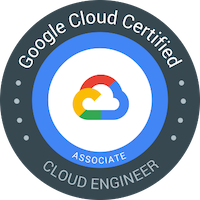GCP Associate Cloud Engineer(ACE)
Google Cloud Platform (GCP) Associate Cloud Engineer (ACE) certification study notes, this guide will help you with quick revision before the exam. it can use as study notes for your preparation.
Dashboard Other Certification NotesGCP Associate Cloud Engineer(ACE)
Each Section contains a number of units. Below Table Link containing information about each sections in detail.

Study Notes
- Mind Map for outlining essential topics
- Fundamentals
- Introduction
- The Google Cloud Platform Resource Hierarchy, Identity and Access Management (IAM), Cloud MarketPlace (Cloud Launcher)
- Compute
- Virtual Private Cloud (VPC), Compute Engine, VPC Capabilities
- Storage
- Cloud Storage, Cloud Bigtable, Cloud SQL, Cloud Spanner, Cloud Datastore, Comparing Storage Options
- Containers
- Google Kubernetes (k8s) Engine (GKE)
- App Engine
- App Engine Standard Environment, App Engine Flexible Environment, App Engine Standard vs Flexible Comparison, App Engine Config Files, App Engine IAM Roles
- Api Management Tools
- Cloud Endpoints, ApiGee Edge
- Development in the Cloud
- Cloud Source Repositories, Cloud Functions
- Infrastructure as Code
- Deployment Manager
- Big Data and Machine Learning
- Google Cloud Big Data Services, Cloud Machine Learning Platform
- Basic CLI Commands
- Introduction
- Essential Cloud Infrastructure
- VPC - Virtual Private Cloud
- IP Addresses, DNS Resolution for Internal Addresses, DNS Resolution for external Addresses, Cloud DNS, Alias IP Ranges, Routes and Firewalls, Network Pricing
- Compute Engine
- Accessing VMs, Instance States, Manage Updates for a Fleet of VMs, Charges for Stopped Instances, Compute Options, Compute Engine Pricing, Compute Engine Roles, Preemtible VMs, Sole-tenant Nodes, Shielded VMs, Confidential VMs, Images, Disk Options, Common Compute Engine Actions, Instance Groups
- Cloud Run
- Cloud Run Pricing, Cloud Run Configurations, Environment Variables for Services
- Cloud Functions
- Cloud Functions Execution Environment
- Cloud IAM
- Identity Access Management, IAM Resource Hierarchy, Organization Node, Resource Manager Roles, Roles, Members, IAM policies, IAM Conditions, Organization Policies, Google Cloud Single Sign-On (SSO), Service Accounts, IAM Best Practices
- Cloud Storage
- Changing Default Storage Classes, Access Control, Cloud Storage Features, Object Versioning, Lifecycle Management Policies, Object Change Notification, Data Import Services, Cloud Storage Consistency, Choosing Storage Class:, Uniform Bucket-Level Access, Cloud Storage IAM Roles
- Filestore
- Databases
- Cloud SQL, Cloud Spanner, Firestore, Cloud Bigtable, Cloud Memorystore
- Resource Management
- Resource Manager, Quotas, Labels, Billing
- Monitoring
- Stackdriver, Stackdriver Monitoring, Stackdriver Logging, Stackdriver Error Reporting, Stackdriver Trace, Stackdriver Debugger
- Audit Logs
- Log Types:, Exporting Audit Logs, Pricing
- VPC - Virtual Private Cloud
- Elastic Cloud Infrastructure
- Cloud VPN
- Cloud Interconnect
- Dedicated Interconnect, Partner Interconnect, Comparison of Interconnect options, Direct Peering, Carrier Peering, Comparison between Direct and Carrier Peering, Choosing a Connection
- Shared VPC and VPC Peering
- Shared VPC, VPC Peering
- Cloud Load Balancing
- Managed Instance Groups, HTTP(S) Load Balancing, SSL Proxy Load Balancing, TCP Proxy Load Balancing, Network Load Balancing, Internal Load Balancing
- Infrastructure Automation
- Terraform, Google Cloud Marketplace
- Managed Services
- BigQuery, Dataflow, Dataprep, Dataproc
- Architecting with Google Kubernetes
- GKE and Kubernetes Concepts
- Google Kubernetes Engine (GKE), Cluster Architecture, Control Plane Components, Node Components, GKE Cluster and Node Management, Pods and Object Management, Workloads, Kubernetes Services, Ingres for GKE, Network Endpoint Groups (NEG), Health Checks, SSL Certificates
- GKE and Kubernetes Concepts
Practice Exams
Support
If you find the content of this website interesting and helpful, use the “🥤 Buy me a Coffee or 👏 Sponsor me”
